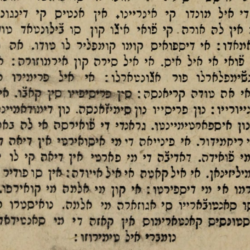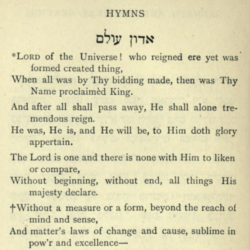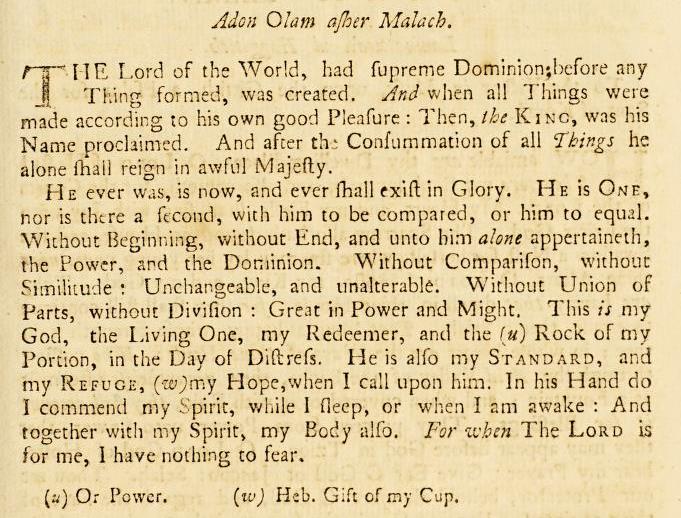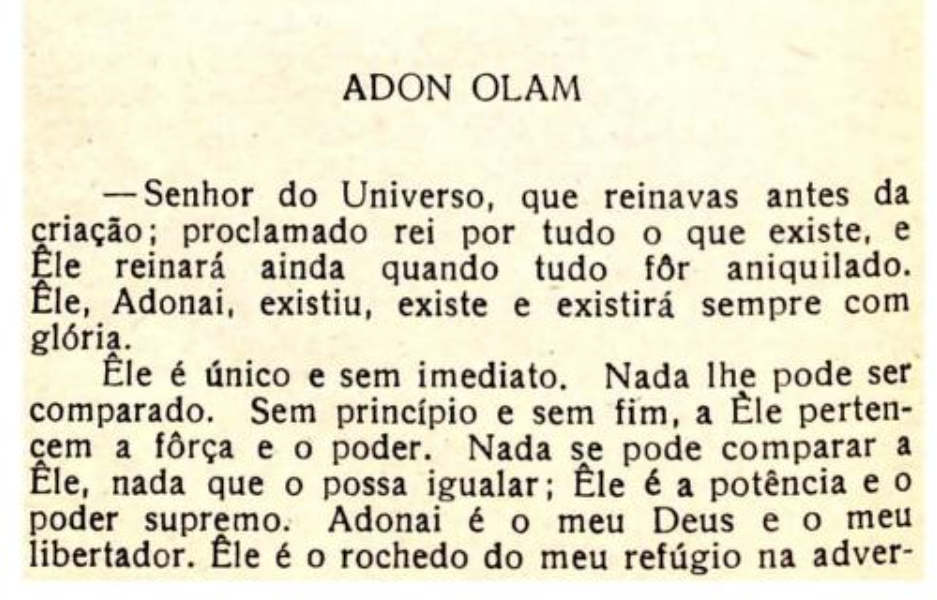| Source (Hebrew) | Translation (English) |
|---|---|
אֲדוֹן עוֹלָם אֲשֶׁר מָלַךְ בְּטֶרֶם כָּל יְצִיר נִבְרָא לְעֵת נַעֲשָׂה בְחֶפְצוֹ כֹּל אֲזַי מֶלֶךְ שְׁמוֹ נִקְרָא |
Lord of the world, who reigned before any creature came to be: by His will all things were made, and then He was called our King. |
וְאַחֲרֵי כִּכְלוֹת הַכֹּל לְבַדּוֹ יִמְלֹךְ נוֹרָא וְהוּא הָיָה וְהוּא הֹוֶה וְהוּא יִהְיֶה בְּתִפְאָרָה |
And when all has ceased to exist, He alone, revered, will reign: He has been, and still He is, and in His majesty He will be. |
וְהוּא אֶחָד וְאֵין שֵׁנִי לְהַמְשִׁיל לוֹ לְהַחְבִּירָה בְּלִי רֵאשִׁית בְּלִי תַכְלִית וְלוֹ הָעֺז וְהַמִּשְׂרָה |
He is One—there is no other to ever approach His grandeur, without beginning, and without end, strength and dominion belong to Him— |
בְּלִי עֵרֶךְ בְּלִי דִמְיוֹן בְּלִי שִׁנּוּי וּתְמוּרָה בְּלִי חִבּוּר בְּלִי פֵרוּד גְּדָל כֹּחַ וּגְבוּרָה |
beyond imagining, beyond measure, unchanging and beyond compare, set apart, yet utterly whole, and wondrous in His might and power. |
וְהוּא אֵלִי וְחַי גּוֹאֲלִי וְצוּר חֶבְלִי בְּעֵת צָרָה וְהוּא נִסִּי וּמָנוֹס לִי מְנָת כּוֹסִי בְּיוֹם אֶקְרָא |
He is my God, my Redeemer lives, He is a Rock in my hour of despair, He is my banner, He is my refuge, He is my sustenance when I call. |
וְהוּא רוֹפֵא וְהוּא מַרְפֵּא וְהוּא צוֹפֶה וְהוּא עֶזְרָה בְּיָדוֹ אַפְקִיד רוּחִי בְּעֵת אִישַׁן וְאָעִירָה |
He is the healer and He is the balm, He keeps watch and comes to my aid, and in His hand I place my soul when I sleep and when I wake. |
וְעִם רוּחִי גְּוִיָּתִי אֲדנָֺי לִי וְלֹא אִירָא בְּמִקְדָשׁוֹ תָּגֵל נַפְשִׁי מְשִׁיחֵנוּ יִשְׁלַח מְהֵרָה וְאָז נָשִׁיר בְּבֵית קָדְשִׁי אָמֵן אָמֵן שֵׁם הַנּוֹרָא |
As my spirit dwells in my body, God is with me—I will not fear: in His abode my soul will rejoice, for our redeemer is on his way, and in the Temple on that day we will sing the awesome Name. |
The piyyut, “Adon Olam” became popular in the 15th century and is often attributed to Solomon ibn Gabirol (1021–1058) and less often to Sherira Gaon (900-1001), or his son, Hai ben Sherira Gaon (939-1038). The variation of the piyyut appearing here is the fifteen line version familiar to some Mizraḥi and eastern Sepharadi congregations. (A twelve line variant is common among the Western Sepharadim. The Ashkenazi version has ten lines.)
The English translation was made by Annie Kantar as published in Invitation to Piyut North America: 18 Piyutim & Mizmorim (2010), p. 17. I have restored the punctuation and layout as initially prepared by Annie Kantar. –Aharon Varady
Source(s)


“אֲדוֹן עוֹלָם (מנהג הספרדים במזרח) | Adōn Olam, translation by Annie Kantar” is shared through the Open Siddur Project with a Creative Commons Attribution-ShareAlike 4.0 International copyleft license.









Leave a Reply